
Current Research in Toxicology
metrics 2024
Navigating the Landscape of Toxicological Discovery
Introduction
Current Research in Toxicology is a pioneering journal published by ELSEVIER that serves as a vital platform for disseminating cutting-edge research in the field of toxicology, spanning from biological impacts to pharmacological applications. With an ISSN of 2666-027X and an impressive Q2 ranking in key categories such as Applied Microbiology and Biotechnology, Health, Toxicology and Mutagenesis, and Toxicology, this journal underscores its commitment to high-quality research and significant contributions to the scientific community. Based in the Netherlands, Current Research in Toxicology aims to bridge the gap between academia and industry by providing rigorously peer-reviewed articles that cover a wide array of topics including novel methodologies, regulatory challenges, and emerging trends within the domain. The journal is accessible through various platforms, making it essential for researchers, professionals, and students eager to stay updated on the latest findings and advancements in toxicology. With a comprehensive focus on integrating theory with practical application, this journal is poised to influence future studies and policies in health and environmental science.
Metrics 2024
 0.72
0.72 2.90
2.90 2.90
2.90 12
12Metrics History
Rank 2024
Scopus
IF (Web Of Science)
JCI (Web Of Science)
Quartile History
Similar Journals
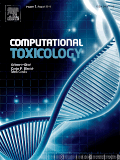
Computational Toxicology
Bridging disciplines for a safer, healthier world.Computational Toxicology is a premier journal published by Elsevier, dedicated to advancing the field of computational approaches in toxicological research. With an ISSN of 2468-1113, this journal provides a platform for researchers and professionals to share their innovative studies and methodologies from 2017 through 2024, promoting insightful discourse in essential areas such as computer science applications and toxicology. Recognized for its rigor and impact, it currently holds a Q2 ranking across various categories, including Computer Science Applications, Health, Toxicology and Mutagenesis, and Toxicology, highlighting its significance in the academic community. The journal is indexed in Scopus, boasting notable ranks including #284/817 in Computer Science Applications and #58/148 in Health, Toxicology and Mutagenesis, demonstrating its vital contribution to addressing contemporary challenges in environmental health and pharmacology. While it is not an open access journal, Computational Toxicology offers valuable insights for students, researchers, and practitioners striving to leverage computational frameworks to enhance the safety and efficacy of substances in human health and the environment.
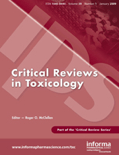
CRITICAL REVIEWS IN TOXICOLOGY
Driving Knowledge Forward in the Realm of ToxicologyCRITICAL REVIEWS IN TOXICOLOGY, published by Taylor & Francis Ltd, stands as a preeminent journal within the field of toxicology, boasting an impressive Q1 ranking and holding the distinction of being ranked 12th out of 133 in the toxicology category according to Scopus, placing it in the top 91st percentile. With a continuous publication history since 1971 and a commitment to providing high-quality reviews, the journal offers critical insight into the latest research and advancements in toxicological sciences. While it is not an open-access journal, it provides numerous access options for both subscribers and institutions, ensuring that its extensive articles are widely available to the academic community. The journal's objectives are to disseminate comprehensive reviews that foster understanding and innovation in the assessment of chemical risks, environmental impacts, and the mechanisms of toxicity, making it an invaluable resource for researchers, professionals, and students dedicated to the science of toxicology.

TOXICOLOGY
Delivering high-impact research for a toxicology-aware society.TOXICOLOGY, published by Elsevier Ireland Ltd, is a prestigious peer-reviewed journal specializing in the field of toxicology. With an ISSN of 0300-483X and an E-ISSN of 1879-3185, this journal provides a vital platform for researchers, professionals, and students to disseminate and access groundbreaking studies from 1973 to present, with a convergence set until 2024. Recognized for its high impact, it holds a Q1 ranking in Toxicology category and ranks #18 out of 133 in Scopus's sector of Pharmacology, Toxicology, and Pharmaceutics, placing it in the 86th percentile. While the journal is not open access, it nonetheless offers a rich collection of research articles that enhance the understanding of toxicological science and its applications. The journal's objectives encompass advancing knowledge in the toxicological evaluation of substances, promoting safety in public health, and fostering dialogue among scholars. As a key resource in the field, TOXICOLOGY plays a crucial role in advancing research and informing practices related to toxicological risks and safety assessments.

Molecular & Cellular Toxicology
Pioneering research at the crossroads of toxicology and pharmacology.Molecular & Cellular Toxicology, published by the Korean Society Toxicogenomics & Toxicoproteomics (KSTT), is a significant journal in the field of toxicology, providing crucial insights into molecular mechanisms underlying toxic responses. With an ISSN of 1738-642X and E-ISSN 2092-8467, this journal serves as a vital platform for researchers, professionals, and students interested in the latest findings and advancements in toxicology, health, and environmental science. Although it operates under a subscription model, it maintains rigorous peer review standards, contributing to its respectable Q3 classification in Health, Toxicology and Mutagenesis, and its Q2 standing in Pharmacology, Toxicology, and Pharmaceutics. The journal, intersecting with innovative aspects of pharmacology and public health, aims to foster a deeper understanding of toxicological impacts on cellular processes and overall health. Located in Germany and supported by a dedicated editorial board, Molecular & Cellular Toxicology stands out in the academic community, encouraging interdisciplinary discourse and collaboration to address critical toxicological challenges. Engage with us for cutting-edge research that informs and shapes the future of toxicological science.
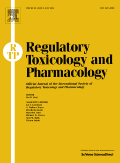
REGULATORY TOXICOLOGY AND PHARMACOLOGY
Transforming Knowledge into Action for Drug SafetyREGULATORY TOXICOLOGY AND PHARMACOLOGY is a prestigious peer-reviewed journal published by Academic Press Inc. Elsevier Science, dedicated to advancing knowledge in the fields of toxicology and pharmacology. With an esteemed impact factor and a current ranking of Q2 in both Medicine and Toxicology, this journal serves as a critical resource for researchers, professionals, and students interested in the regulatory aspects of drug safety and environmental toxicology. The journal publishes original research articles, reviews, and regulatory updates that reflect the latest insights and methodologies in safety assessment and toxicological research. Established in 1970, the journal continues to play an integral role in shaping the scientific discourse around regulatory practices in pharmacology, ensuring that both academic and practical perspectives are captured. Readers can access the articles through subscription services, allowing them to stay informed of the most significant developments in the field.

Toxicology Research
Driving innovation in environmental and pharmacological toxicology.Toxicology Research is a distinguished journal dedicated to advancing the field of toxicology through the dissemination of high-quality research. Published by Oxford University Press, this UK-based journal focuses on critical aspects of toxicology and mutagenesis, highlighting both environmental and pharmacological implications. With an ISSN of 2045-452X and an E-ISSN of 2045-4538, it serves as a valuable resource for researchers, professionals, and students alike. Currently categorized in the Q3 quartile for Health, Toxicology and Mutagenesis, as well as Toxicology in 2023, Toxicology Research maintains a visible presence in Scopus rankings, positioning itself within the targeted professional community. Although the journal operates without open access options, its importance in contributing to scientific discussions and policy formation is undeniable. Covering content from 2012 to 2024, it continues to provide insights into contemporary toxicological challenges, thereby fostering interdisciplinary collaborations and informing best practices in health and safety.
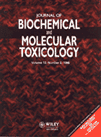
JOURNAL OF BIOCHEMICAL AND MOLECULAR TOXICOLOGY
Pioneering Research in Biochemical InteractionsJournal of Biochemical and Molecular Toxicology, published by Wiley, plays a pivotal role in the advancement of knowledge within the fields of biochemistry, toxicology, and molecular biology. Established in 1998, this esteemed journal has garnered a significant reputation, evidenced by its current placement in the Q2 quartile across several categories, including Biochemistry, Health, Toxicology and Mutagenesis, and Medicine. With an ISSN of 1095-6670 and an E-ISSN of 1099-0461, it serves an international audience, offering critical insights and innovative research that shape our understanding of biochemical interactions and toxicological assessments. While it does not operate on an open-access model, the journal ensures rigorous peer review and high-quality publication standards, making it a valuable resource for researchers, professionals, and students dedicated to the exploration of molecular toxicology. The journal's recognized impact within the scientific community is reflected in its competitive rankings among specialized journals, fostering significant contributions to both academic and applied contexts.
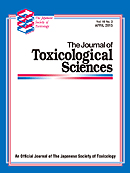
JOURNAL OF TOXICOLOGICAL SCIENCES
Enhancing Knowledge in Toxicology and BeyondThe Journal of Toxicological Sciences, published by the Japanese Society of Toxicological Sciences, is a prominent academic journal dedicated to the comprehensive study of toxicology and its related fields. Since its inception in 1976, the journal has provided a vital platform for researchers and professionals to disseminate innovative findings and insights in toxicology, with a focus on both experimental and clinical studies. Positioned in the Q3 quartile across various relevant categories, including Medicine (miscellaneous) and Toxicology as of 2023, the journal plays an essential role in advancing our understanding of toxic substances and their effects on biological systems. Although currently not open access, the journal maintains high academic standards and is indexed in Scopus, ranking #96 in Toxicology. Offering unique perspectives from Japan, it encourages global collaboration and discourse among toxicologists, making it an invaluable resource for students, researchers, and industry professionals alike.
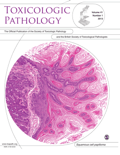
TOXICOLOGIC PATHOLOGY
Unraveling the Mysteries of Substances and Biological SystemsTOXICOLOGIC PATHOLOGY, published by SAGE Publications Inc., is a dedicated journal that serves as a pivotal platform for researchers and professionals in the fields of toxicology and pathology. With an ISSN of 0192-6233 and E-ISSN of 1533-1601, the journal has been committed to advancing knowledge since its inception in 1972. It boasts impressive rankings in the recent 2023 category quartiles, achieving Q2 in Pathology and Forensic Medicine, and Q3 in Cell Biology, Molecular Biology, and Toxicology, marking it as a significant contributor to these vital disciplines. Despite its non-open access status, the journal ensures accessibility through various premium library subscriptions, providing readers with essential insights on toxicologic and pathologic research, advancing both academic inquiry and practical applications. Researchers, students, and industry professionals alike will find TOXICOLOGIC PATHOLOGY an indispensable resource, offering high-quality peer-reviewed articles that explore the complex interactions between substances and biological systems, with the aim of improving public health and safety.

Forensic Toxicology
Pioneering Research in Forensic ToxicologyForensic Toxicology is a premier journal published by Springer, renowned for delivering cutting-edge research in the realms of toxicology, biochemistry, and forensic medicine. With an ISSN of 1860-8965 and an E-ISSN of 1860-8973, this journal has established itself as a significant resource for professionals, researchers, and students engaged in the analysis of toxic substances within a forensic context. Its impressive impact factor and ranking reveal its influential presence in the field, particularly as it is categorized in Q1 for Pathology and Forensic Medicine and Q2 for Biochemistry (Medical) and Toxicology. Featured articles span a wide array of topics, facilitating interdisciplinary collaboration and advancing scientific knowledge. While currently not an open-access journal, it remains accessible through institutional subscriptions. With a convergence span from 2006 to 2024, Forensic Toxicology is committed to publishing high-quality research that enhances the understanding of toxicological phenomena and their implications in forensic investigations, reinforcing its role as an indispensable resource in the scientific community.